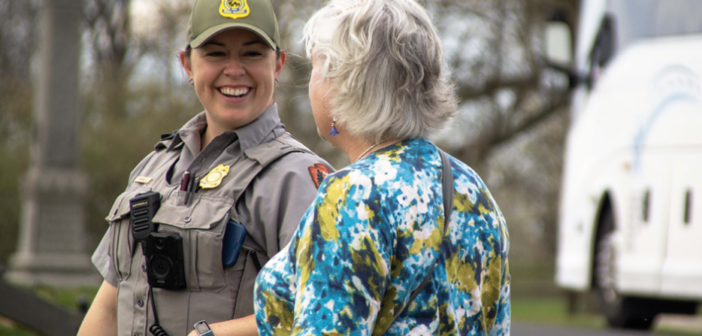Meet the people behind some of the most unique careers in Adams County
By Karen Hendricks
Meet five Adams Countians who describe how they designed and pursued their dream jobs in extremely unique fields. Some of their positions are so niche, you may not have even heard of them. (Soil microscopy, anyone?) And if you think you know what it takes to become a park ranger or a farmer, you might think again, when you hear what the jobs entail—especially for area mushroom farmers! Career paths are often winding, as is the case for a local backpacking trail guide. Grit, perseverance, creativity and luck: All those factors came together, and these individuals found their true callings.
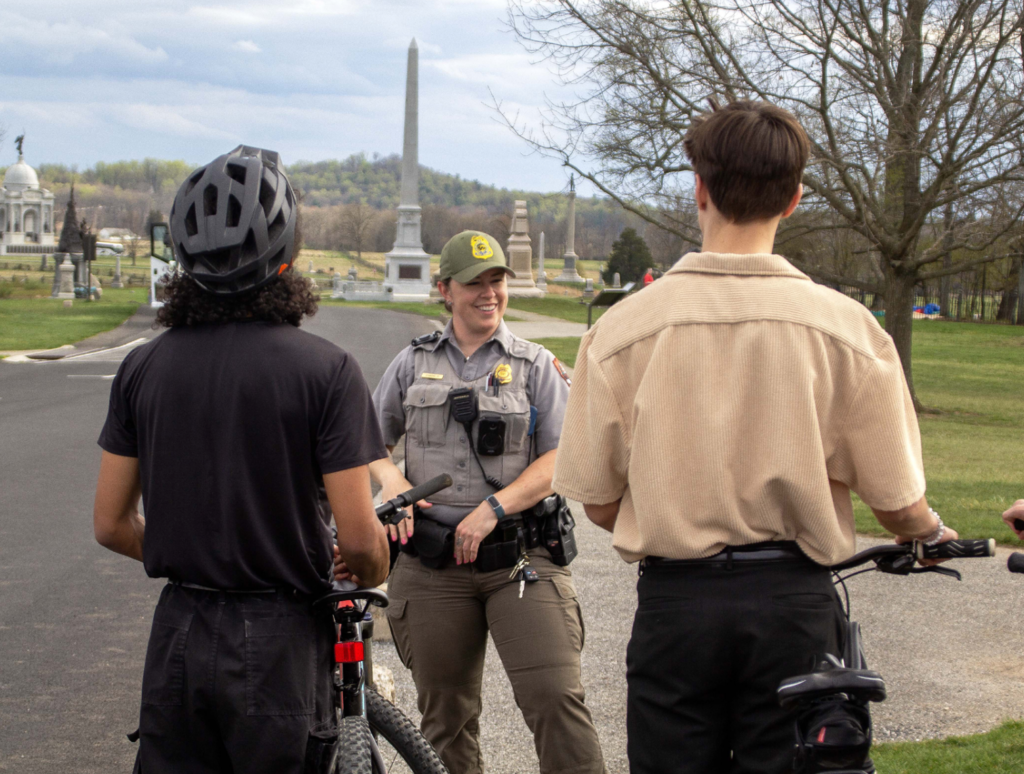
Amanda Cymore: Protecting History
Law Enforcement Ranger, Gettysburg National Military Park
When Gettysburg National Military Park is your workplace, there’s no such thing as a typical workday.
Some days, Amanda Cymore sees wildlife—red foxes, hawks and owls—and other days, she’s educating the public, talking about history. But as a federal police officer, she’s also addressing traffic violations, disorderly conduct, EMS calls, emergencies and crimes.
“We’re not only protecting people, but the earth, the birds, a thousand dead soldiers, and the bullets and buttons in the ground—because unfortunately, there are also treasure hunters,” says Cymore, 39. “We’re not just law enforcement—we’re also protecting history.”
One of the most unusual days on the job happened last summer, when a contractor working on Little Round Top had an accident with a concrete saw blade. Cymore, as the only ranger on duty at the time, had to figure out the logistics for a medivac helicopter in the midst of visitors exploring the battlefield, as well as nearby crops to be protected from the potential devastation of a helicopter landing.
There’s another aspect of her job that the public might not realize.
“We regularly encounter people asking how they can legally deposit family members’ ashes here, and many are descendants of soldiers who fought here. People need to obtain a permit to do it,” Cymore explains. “It’s incredible to me how passionately people feel about this place and returning their loved ones to this place.”
Her love of Gettysburg began during a childhood family trip. A history major in college, Cymore set her sights on becoming a ranger—first in her native New York state park system, then at the federal level, including the National Mall. Today, she’s one of eight law enforcement rangers at Gettysburg.
“I used to work at the Lincoln Memorial, by the stone dedicated to the place where MLK gave his ‘I Have a Dream’ speech. Now I answer questions about where Lincoln stood to deliver the Gettysburg Address,” says Cymore. “It’s important for people to stand in the places where history happened.”
Those are moments that she treasures.
“I regularly encounter people at The Angle, the target of the Confederate attack during Pickett’s Charge—big, burly tough-looking guys, staring out there, tears in their eyes,” Cymore says. “People come here every day and have dramatic moments, thinking about their own history, and I get to be part of that.”
“Being a ranger is in my blood,” says Cymore. “I’m in my dream job, big time.”
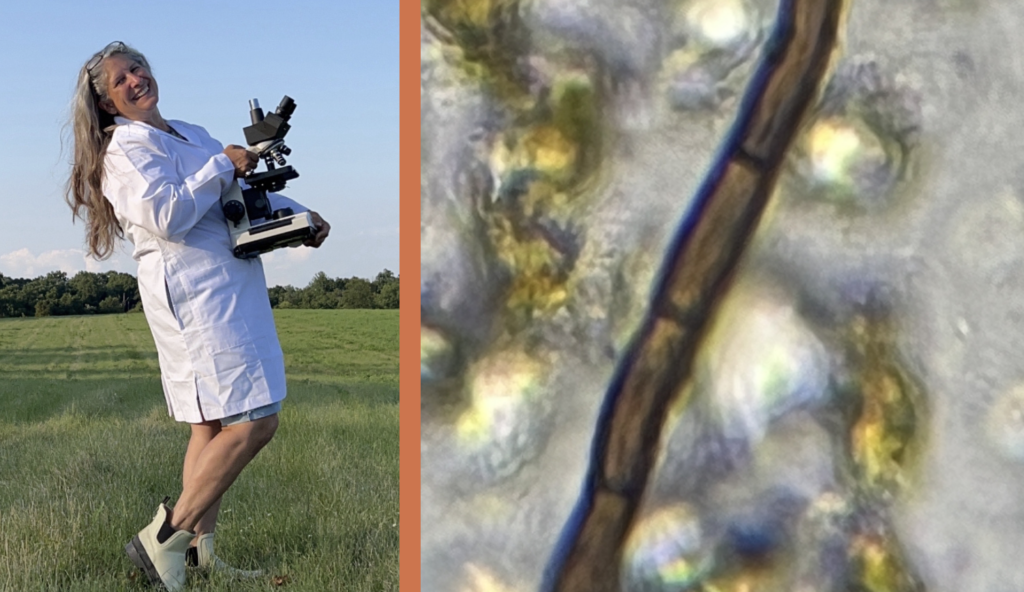
Suzanne Shea: Getting to the Root of Things
Soil Microscropist and Owner, Microbifecta
When Suzanne Shea says she’s working out in the field, she means it literally.
As a soil microscopist, she takes soil samples from the fields and gardens she’s standing in and analyzes them under her portable, high-powered and battery-operated microscope.
She’s looking for a ratio of bacteria and fungi—and the target ratio is different depending on what’s being grown or composted.
“I’m like a doctor giving out a prescription, saying, ‘Here’s what you need to make your soil healthier,’” says Shea, 60, of Gettysburg.
Certified by the Soil Food Web program, Shea owns and operates a soil consulting business, Microbifecta. She also serves as a district representative on the Pennsylvania Farm Bureau’s Women’s Leadership Committee.
While she admits she has always loved playing in the dirt, making mud pies as a child, she never envisioned this career path until 2020, in her mid-50s.
Shea grew up on a dairy farm in Carroll County, Maryland, and originally pursued a career as a travel agent. As she and her husband began a family, she transitioned to homeschooling their children—all eight of them, over the course of 32 years.
When the family moved to a 45-acre Gettysburg farm in 1998, she was discouraged when an expert told her the soil was too poor to grow anything.
“I set it on the back burner and figured I would eventually figure it out,” says Shea. “I’ve always been interested in knowing how to have the best soil, getting to the root of things.”
During those years of homeschooling, she nurtured “ongoing curiosity” in her children—and herself. Shea says, “When the children had questions, I would say, ‘Let’s find out.’”
She applied it to her own life in early 2020.
While turning into her driveway, her vehicle was struck in a hit-and-run accident that left her with a whiplash concussion. Shea had to regain basic skills through speech, physical and occupational therapies.
“I refused to be a victim of this situation, and I wanted to take back control of my life,” Shea explains.
She connected with educational expert and author Pat Wyman, who suggested Shea pursue vision therapy too. It was there that Shea was identified with visual recognition ability.
Visual recognition ability is the brain’s ability to identify and interpret what you’re seeing—which is heightened, or advanced in her case. “I called it my new superpower,” says Shea.
That’s when she began pursuing the education and training she’d put on hold for many years, becoming a soil microscopist. Through the lens, her eye now identifies microscopic organisms. She relates to the natural, green approach to amending soil—and enjoys helping others avoid expensive chemicals and amend soil depleted by years of chemical fertilizers.
In addition to soil assessments in Adams County and Maryland, she’s consulted on high-profile projects throughout the Mid-Atlantic. She’s assessed soil in George Washington’s garden at Mt. Vernon; the City of Richmond’s James River canal system’s compost and water gardens; and a Manassas, Virginia, facility composting 30,000 tons of food waste annually.
“The concussion was the springboard that got me into this—that’s the positive way of looking at this,” says Shea. “I almost feel like my age is the prime time to start a career—it’s never too late. Everything I’ve experienced in my life ties to this.”
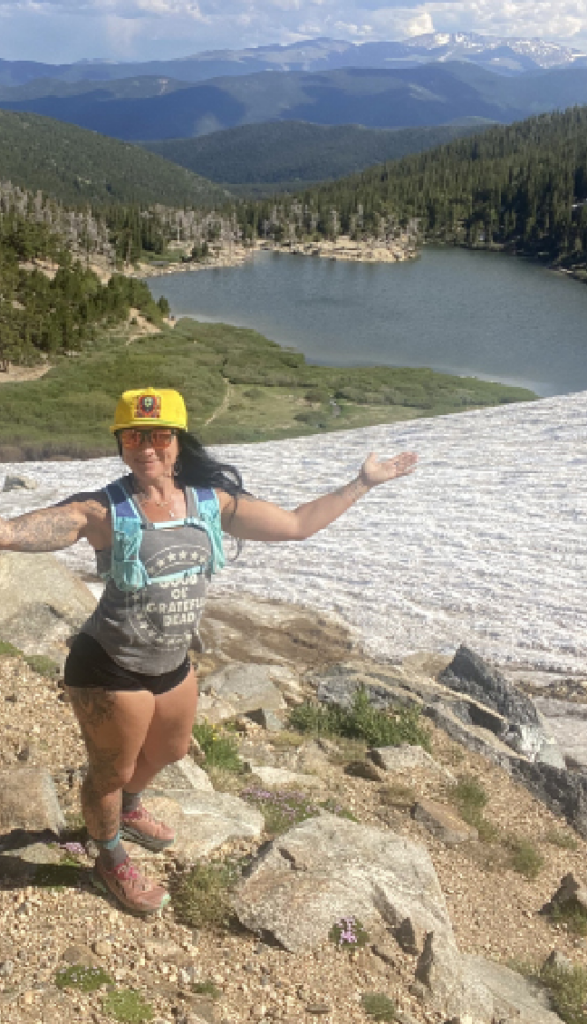
Crystal Krumrine: Getting to the Top
Backpacking Guide, Happy Hippy Outfitters
Last September, 10 women not only completed a 20-mile weekend hiking trip on the Appalachian Trail, but they did it through Hurricane Ophelia.
“We laughed—and at the end, we cried, because some of the women couldn’t believe they did it,” says Crystal Krumrine, 46, of Abbottstown. “All the bonding that took place meant the world to me.”
Krumrine, owner and operator of Happy Hippy Outfitters, was their trail guide. She prepared the women through a “Backpacking 101” course, completely outfitted them with gear, then served as their navigator and leader.
Her experience—as a lifelong hiker and lover of the outdoors, science teacher of 20 years, wildlife biologist, climbing instructor, health coach and fitness trainer—all led her to this point. She’s currently teaching biology and wilderness survival at New Oxford High School.
Survival is something she identifies with.
“I was in an unhealthy relationship for 13 years,” said Krumrine, now divorced. “I went from being a silent survivor to finding myself again.”
Hiking outdoors, “putting one foot in front of the other,” she says, brought healing. That’s when she had the idea to create Happy Hippy Outfitters.
“I thought to myself, ‘I love this so much—I wonder if other women would too,’” Krumrine explains. So last summer, she created a Happy Hippy Outfitters Facebook page and asked. Responses came back positively, and she launched the business with two backpacking trips last year and more planned this year.
“As a single mom of four, I’m busy, but that’s one of the reasons I’m doing this—to show my kids that no matter what, keep pushing for your dreams,” says Krumrine. “Outdoor adventure is dirty and messy, a reminder that life is a hard climb to get to the top. But when you get to the top, it’s beautiful, and it feels like the perfect metaphor for life. When you tackle one obstacle after another, there’s always beauty on the other side.”
Melanie Murphy and Johnathon McGrain: Life Beyond Portobellos
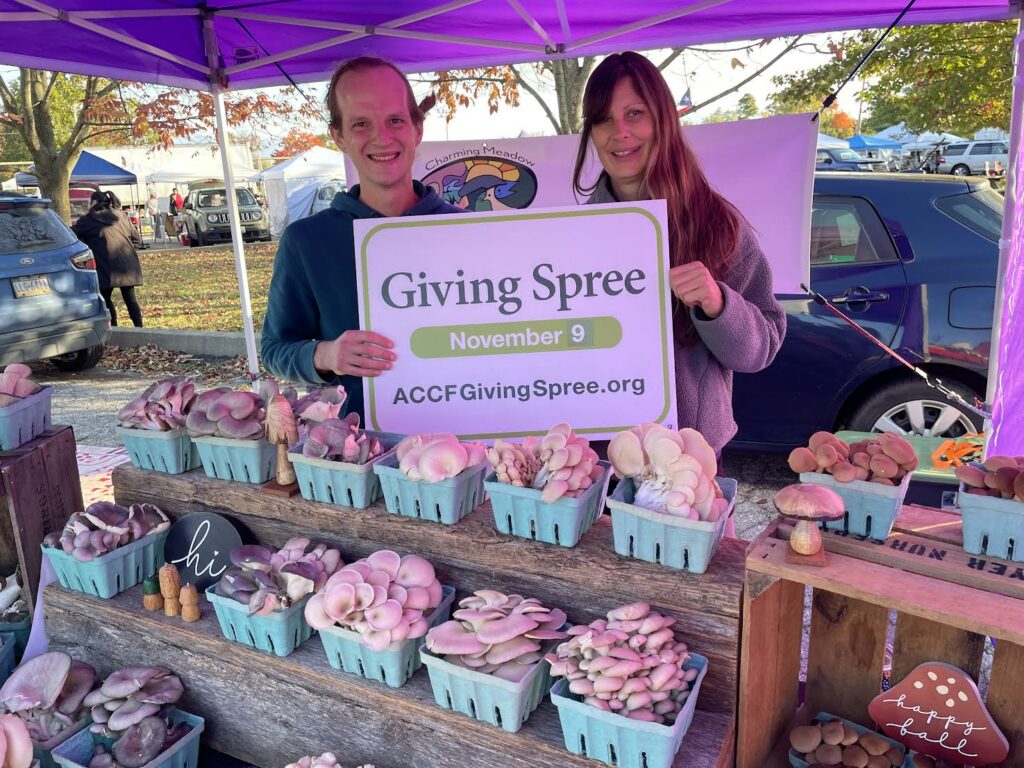
Mushroom Growers and Owners, Charming Meadow Mushrooms
Tutoni’s Restaurant in York was the first to put Charming Meadow Mushrooms on its menu.
More restaurants soon followed, reading like the area’s guide to fine dining: Antrim 1844 in Taneytown, Maryland; Carriage House Inn, in Emmitsburg, Maryland; One Lincoln at the Gettysburg Hotel and Gettysburg’s Sign of the Buck.
Home cooks, too, were hungry for local mushrooms. Melanie Murphy and Johnathon McGrain began selling their Charming Meadow Mushrooms at the Adams County Farmers Market and year-round at Central Market York.
Three years later, the Gettysburg couple is growing and selling 200 pounds of mushrooms weekly, gearing up for 300 to 400 pounds and adding Frederick, Maryland’s City Market into the mix.
“Other parts of the world have been eating these mushrooms for hundreds of years, so our culture is catching up with that,” says McGrain. “It’s eye-opening, because people are starting to realize there’s life beyond button mushrooms or portobellos.”
Variety abounds—the couple grows a dozen types of oyster mushrooms alone, plus shiitake, black king, lion’s mane, nameko and more.
“It was a business born out of Covid,” says McGrain. The couple worked in the area restaurant industry for years—they met at Appalachian Brewing Co. But during Covid, they moved to Murphy’s mother’s home, tucked into the woods near the Mason-Dixon Line with a charming meadow on the property.
“We moved here to build a tiny house on wheels to move to North Carolina—and we never left,” says Murphy. They’re still living in the tiny home, because, in the midst of Covid, like many Americans, they discovered a new hobby and reprioritized their career goals.
“I was reading a Mother Earth News magazine one day, and there was an article about growing mushrooms. I saved it for John because I knew it was something he’d enjoy reading,” says Murphy.
Not only did he enjoy reading it, but he wanted to give mushroom growing a shot.
“It’s challenging—and that keeps my interest,” McGrain says. “The process differs from what people think. We grow wood-loving mushrooms, so the process is very clean—one of the biggest challenges is keeping everything sterile and as clean and possible. [Unlike some mushroom farms], there’s no manure involved.”
He’s developed a growing method that relies on sterile “blocks” made from sawdust (from East Berlin’s Pennwood Products) and sorghum (from Aspers’ Fields of Adventure). The intricate step-by-step process includes steamers and pressure cookers, tissue cultures and petri dishes, with growing stations inside a shed. Temperature and humidity are carefully regulated.
Some mushrooms are harvested after a month, while others take up to 15 weeks. The end results are fungi full of nutritional benefits.
“Mushrooms are the only source of vitamin D that’s not animal derived, other than the sun,” says McGrain. “They’re high in protein, lots of minerals—potassium and magnesium, and a lot of different compounds, including polysaccharides, which are good for stabilizing blood sugar and aiding cholesterol. Lion’s manes are known to be good for your brain and memory—they’re working on those for Alzheimer’s disease research.”
Ultimately, the couple is thrilled to be working for themselves.
“It means freedom from working in restaurants,” says Murphy. “It’s more work, but it doesn’t feel like it.”
“You get all the return you put into it, whereas if you’re working for someone else, they’re getting all the return—and we’re both hard workers,” says McGrain. “We believe good food is medicine, and we love to produce food for people.”
Designing a Dream Career
Thinking about pursuing your own dream career goals? Crystal Krumrine, founder of trail-guiding business Happy Hippy Outfitters, encourages others to keep a journal for their ideas. “As those thoughts come, you need to write them down,” Krumrine says.
Then, it becomes a matter of “trusting and letting go,” she says. By that she means to trust in your dreams and let go of fears.
“Stop thinking it’s going to be too hard, or that you’re not ready, because that’s a waste of your energy—instead, use your energy to create your dreams,” Krumrine says. “Motivation is a choice.”
And she has additional words of wisdom for women.
“I really want women to realize that just because you’re a caregiver or a mother that you are still important, and you’re never at an age where you should stop dreaming,” Krumrine says. “You should continue to live, not just for others, but for yourself. I’m blessed to have learned it now than to have never.”

